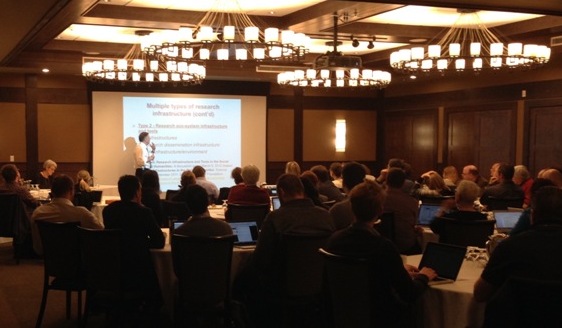Alyssa Arbuckle, Assistant Director, Research Partnerships & Development, Electronics Textual Cultures Lab (ETCL), University of Victoria
Ray Siemens, Canada Research Chair in Humanities Computing and Distinguished Professor of English in the Faculty of Humanities with cross appointment in Computer Science, University of Victoria
The humanities and social sciences have moved online, and this shift has changed the way knowledge is shared between scholars, students, the public, and other aligned groups. For instance, ideas asserted in informal venues can be circulated widely via social media, and research papers can be published in electronic, open source journals accessible to all. Beyond the viral sharing capacity of the internet, however, digital tools also introduce new ways of creating knowledge.
Data mining tools can be applied to large corpora of text in order to reveal connections that were not obvious at first glance. Plug-ins for digital publishing platforms allow users to opt-in to peer review systems that are simultaneously credible, open, and nuanced. Visualization tools can represent datasets in ways that are conceptually unique. Social networks can instigate the engagement and participation of dispersed groups who share an affinity for certain cultural material. And so on.
Recently, the Implementing New Knowledge Environments (INKE) research group hosted a gathering in Whistler, BC, called “Sustaining Partnerships to Transform Scholarly Production.” This gathering brought together national and international representatives from academic and academic-aligned communities that are invested in the future of digital communication. During “Sustaining Partnerships,” many returned to the potential that evolving digital tools and platforms have for the humanities and social sciences.
Participants discussed the challenges of navigating and contributing to the Canadian digital ecosystem, as well as the importance of standards, open access policies and practices, and connections across disciplines, institutions, and organizations to help make the best use possible of the resources and expertise at hand. The Federation’s Executive Director, Jean-Marc Mangin, participated in “Sustaining Partnerships” and shared the Federation’s efforts toward developing an Open Access policy for scholarly publications, thereby supporting the Canadian publishing community.
The transformation that the humanities and social sciences are undergoing is substantial, and requires careful consideration and concerted effort. Moving forward, INKE’s goal is to explore, research, and build environments for open social scholarship in Canada. In doing so, the group will leverage national and international research, digital infrastructure, and dispersed resources to develop innovative publishing and communication environments that connect those who share this need—including the Canadian public and academic, organization and industry partners.
For further information, please navigate to inke.ca.
INKE is grateful for the generous sponsorship, support, and participation at “Sustaining Partnerships to Transform Scholarly Production” of the Advanced Research Consortium, Canadian Association of Research Libraries, Canadian Institute for Studies in Publishing, Canadian Research Knowledge Network, Canadian Writing Research Collaboratory, Canadiana.org, Centre de recherche interuniversitaire sur les humanités numériques, Compute Canada, Digital Humanities Summer Institute, Digital Research Centre, Editing Modernism in Canada, eHumanities Group, Electronic Textual Cultures Lab, E-READ, Érudit, Federation for the Humanities and Social Sciences, Government Communications and Public Engagement (British Columbia), Iter, Justice BC, MakerLab in the Humanities, Modernist Versions Project, Public Knowledge Project, Social Sciences and Humanities Research Council of Canada, and University of Victoria Libraries, among others.

